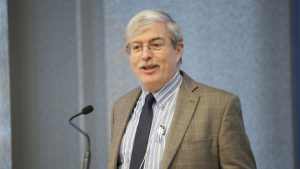Beyond Rocket Science: Meeting the Challenge of Educating Citizens for a Complex World
by Dr. Alan Sears, Faculty of Education, University of New Brunswick

In the spring and summer of 2015, Zunera Ishaq provoked a widespread debate in Canada when she insisted on wearing her niqab while she took the oath to become a Canadian citizen.
Around the same time, a debate was brewing in New Brunswick about whether or not Anglophone and Francophone students should ride the same school buses. One headline in the National Post declared, “N.B. education minister angry after learning French and English students have been sharing a school bus.” The story went on to say that “the provincial government claims it is constitutionally mandated to provide separate buses for Anglophones and Francophones.” Later that same spring, members of the small Lax Kw’alaams First Nation in north-western British Colombia overwhelmingly rejected a $1 billion cash offer, as well as the transfer of 2,200 hectares of crown land, for their consent to the building of a liquefied natural gas (LNG) shipping terminal in the region. Both industry and provincial government officials were left scrambling to keep what they see as a key industrial project on the rails.
Whether any of these three particular issues has staying power in Canadian public policy debates remains to be seen, but they are indicative of the ongoing Canadian conversation about how it is we live together with significant individual and collective differences. Questions about the reasonable accommodation of immigrant groups, the preservation of official language minority rights, and the fostering of Aboriginal rights are just some of the ongoing issues that permeate political and social discourse in Canada. Effective citizenship requires people who understand the subtle nuances inherent in these matters and are able to wrestle intelligently and respectfully with difficult questions that emerge from them.
Ontario, like all jurisdictions in Canada, places a high rhetorical value on fostering just this kind of substantial citizenship through public schooling. Unfortunately, there is considerable evidence to suggest that rhetoric is not matched in actual policy and practice in schools. Matching the rhetoric about citizenship education with actual practice will require a number of things:
- Taking citizenship seriously. Citizenship in schools is often reduced to simply being a nice person or to volunteering in the community. As the issues above make clear, it is much more than that. As Ken Osborne argues, “Citizenship demands more. It requires a willingness and ability to play an active and morally principled part in the public life of one’s society.”
- Taking knowledge seriously. The knowledge necessary for citizenship goes well beyond the ability to describe how a bill is passed or to name the date of Confederation. Knowledgeable citizens need to understand the complex nature of key issues and concepts, and how people with different political, social, or cultural worldviews understand these differently.
- Taking students seriously. Research on student thinking demonstrates that with good teaching, even very young children can wrestle with and come to understand complex ideas and skills.
- Taking teaching seriously. Teaching students the multifaceted ideas and concepts of democratic citizenship requires teachers who understand the ideas and concepts themselves and are highly skilled at structuring learning experiences which nurture enhanced understanding in students. This is a complex task and requires teachers with significant academic and professional education and experience in the field.
Recently I heard social studies, the school subject where citizenship receives the most explicit focus, described as, “not rocket science.” In other words, it is relatively simple, even trivial. Fostering citizens who understand and can wrestle intelligently and empathetically with the complicated questions that permeate civic life in Canada is hardly simple. It is, in fact, much tougher than rocket science.
